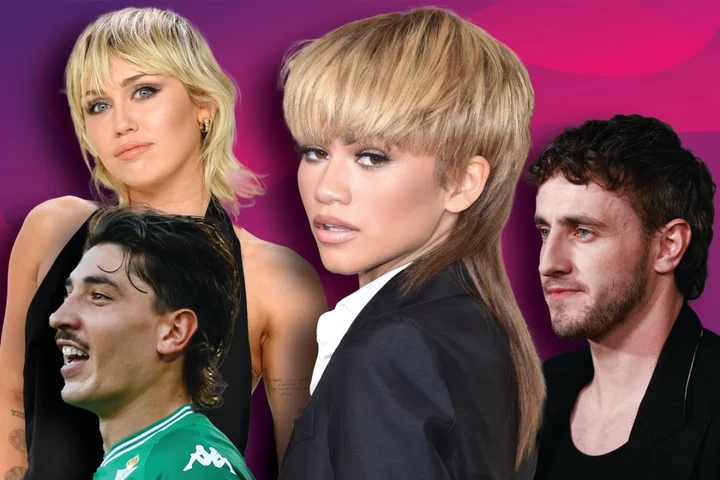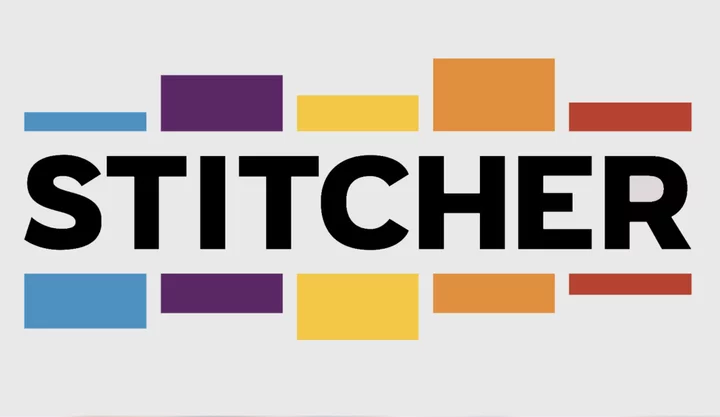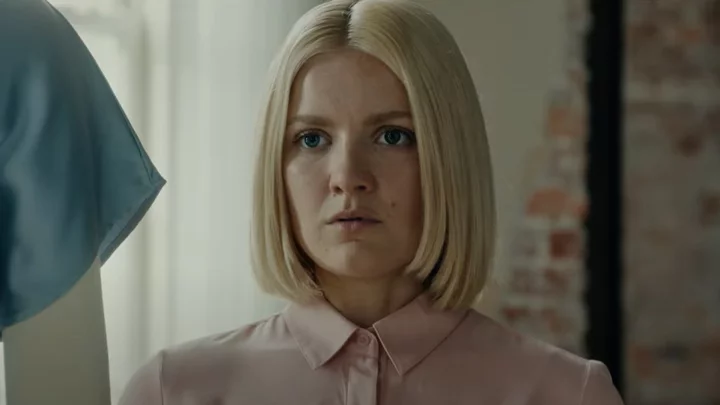Mullets are officially back. And, no, we haven’t lost our minds
Everywhere I go, I am being stalked by mullets. Walk into a pub in the vicinity of Hackney, east London, and you, like me, will be haunted by the sight of them. Queue for a Fred Again concert and you’ll see an ocean of the things. Go to a rugby match at Twickenham Stadium, and there will be as many mullets as there are team shirts. Whether you know it as the mullet or the “Kentucky waterfall” or “beaver paddle”, they’ll have been in your sightline as of late. The hairstyle, which involves a shorter crop at the front, top and sides, and longer in the back, is currently being paraded by on-screen heartthrobs like Paul Mescal, Australian actor Jacob Elordi and American movie star Timothée Chalamet. In the world of sport, Spanish footballer Hector Bellerin, British rugby player Joe Marler and Formula One driver Valtteri Bottas have all rocked the hairstyle this year (and that’s not forgetting about 90 per cent of “Aussie rules” football players have mullets right now too). But its ubiquity in modern pop culture goes back a few years. Singer Lil Nas X, for example, turned up at the MTV Awards in 2021 wearing a curly, layered version of the hairstyle. Women have been wearing the coiffure even longer. Pop culture mainstays like Rihanna and Zendaya have both worn mullets on the red carpet, in 2013 and 2016, respectively. By 2021, Miley Cyrus was donning the style. That same year, Vogue hailed the mullet as the unlikely star of modern street style. The mullet has also stormed down fashion week runways, with Junya Watanabe, Stella McCartney and Alexander McQueen all incorporating the hairstyle into their 2022 shows. If that wasn’t enough proof of the mullet going mainstream, a failsafe method for judging something’s popularity is when that trendy thing gets banned in schools, or there’s a level of moral panic about it. That happened last month when a Sunderland schoolboy’s mullet was decided to be so “extreme” that he was put in isolation and ordered to chop it off. Meanwhile, even more Brits are trying to catch up with Australian mullet culture: a doctor from Dorset made headlines this week as he has been growing his locks in preparation for the world mullet growing championships in Australia, a contest that he said was “widely considered to be the Everest of the competitive mullet growing world”. We’ve all gone mullet mad. Though the name itself wasn’t coined until two decades ago – the Oxford English Dictionary credits the Beastie Boys’ 1994 song “Mullet Head” for the popularisation of the word – the mullet existed long before that. In his book Mullet Madness, Alan Henderson writes that prehistoric people may have figured out that having their hair cut shorter at the front and longer at the back meant they could keep their hair out of their eyes and their necks still toasty. What’s more, Ancient Greek texts referenced men with mullet-style cuts, while depictions of Greek gods that date back to the 6th century suggest that the hairstyle existed even then. In certain indigenous populations in the US, long hair symbolises power and a connection with the divine, and a version of the mullet – the front spiked and the back long – is considered a traditional style in tribes of the western United States like the Blackfoot and Crow. The version of the mullet we see in popular culture today, though, strongly harks back to David Bowie’s tangerine-orange waterfall-style mullet worn as his alter ego Ziggy Stardust. In the Seventies, it set a cultural precedent for the mullet as a fashion statement. Back then, the hairstyle was subversive. It spurred strong reactions from the more conservatively coiffed elite because it refused to conform to any one standard: the mullet is both long and short; masculine and feminine; somehow, scruffy while slick. The mullet’s return could be seen as a happy accident. In lockdown, men would scissor away at their locks, crafting eccentric hairstyles out of sheer boredom, sharing pictures of the resulting cut to their respective WhatsApp group chats. But that comedy mullet has since died out. A fashionable, en-vogue hairstyle has stuck around. In searching for the perfect modern mullet, men have downed tools and turned to the professionals for help. Ryan Lewis, owner of Club 13 barbershop in Hull, says that about one-third of his customers are opting for mullets. “Its presence within combat and contact sports alone conveys a modern masculinity that has trickled down into the mainstream,” he says, adding that the “harsher cuts” seen in rugby culture are being cancelled out by the more subtle, feathery mullets worn by Mescal et al. “The modern mullet is bringing a more natural and effortless look with a softer and less obnoxious shape.” James Doyle, the manager of Bristol barbershop Harry Blades and Angry Daves, says it’s not just people who work in non-corporate environments who are taking the plunge, either: it’s becoming workplace-appropriate. “You would think it’s only the musicians or creatives,” he says. “But I’ve got a couple of accountants that are rocking mullets. Anyone and everyone seems to be jumping on the trend.” The mullet trend allows men to be more expressive and embrace their individuality. I had a sixth form student come in the other day and ask for a mullet – young men are becoming more daring with their hair Samantha Perkins, salon owner and lecturer The style has become so sought after that hairdressing schools are changing the way they train stylists, too. Samantha Perkins is the owner of the salon Hair by Sam and lectures at the London Hairdressing Academy, and says that the academy has launched special masterclasses in the art of cutting mullets due to popular demand. “It’s very technical,” she explains. “It’s cut with scissors and razors, so without using clippers – so it’s already a level three cut without a doubt. Students really need to understand the hair type to execute the look.” Perkins adds that the supremacy of the cookie-cutter “short back and sides” haircut that has dominated men’s hairdressing trends for the past decade is on its way out. “The mullet trend allows men to be more expressive and embrace their individuality,” she says. “I had a sixth form student come in the other day and ask for a mullet – young men are becoming more daring with their hair.” Michael Kent, a stylist at Blue Tit hair salon in London, agrees that the popularity of the mullet hairstyle has opened up a new way of self-expression for men. “Men’s hair has always been so bland and [the mullet] has allowed people to really embrace their individuality. In popular culture, a lot of people are more comfortable in their sexuality and diversifying so much. We’re seeing a lot of clients coming in and asking for a cut like Timothée Chalamet’s. Before, people would ask for Ed Sheeran’s hair, so you can see how it’s changing.” The mullet is not just limited to men, either. The coif has long been donned by famous women (Scarlett Johansson, Joan Jett and Dolly Parton have all worn variations of the style over the years), and both Perkins and Kent say they have women customers asking for the same. “The mullet is a genderless cut,” says Kent. “Women and men are really embracing it – it’s an androgynous look.” And if you want to try the mullet yourself, Kent assures me it suits most people: “It’s like a wig you can put on anyone!” Read More Women’s scarves and crocheted ties - what is Robert Peston wearing now? I salute Dolly Parton’s beauty routine – no one sees me without my make-up How Naomi Campbell proved all her haters wrong – including me Women’s scarves and crocheted ties - what is Robert Peston wearing now? I salute Dolly Parton’s beauty routine – no one sees me without my make-up How Naomi Campbell proved all her haters wrong – including me

Everywhere I go, I am being stalked by mullets. Walk into a pub in the vicinity of Hackney, east London, and you, like me, will be haunted by the sight of them. Queue for a Fred Again concert and you’ll see an ocean of the things. Go to a rugby match at Twickenham Stadium, and there will be as many mullets as there are team shirts. Whether you know it as the mullet or the “Kentucky waterfall” or “beaver paddle”, they’ll have been in your sightline as of late.
The hairstyle, which involves a shorter crop at the front, top and sides, and longer in the back, is currently being paraded by on-screen heartthrobs like Paul Mescal, Australian actor Jacob Elordi and American movie star Timothée Chalamet. In the world of sport, Spanish footballer Hector Bellerin, British rugby player Joe Marler and Formula One driver Valtteri Bottas have all rocked the hairstyle this year (and that’s not forgetting about 90 per cent of “Aussie rules” football players have mullets right now too). But its ubiquity in modern pop culture goes back a few years. Singer Lil Nas X, for example, turned up at the MTV Awards in 2021 wearing a curly, layered version of the hairstyle.
Women have been wearing the coiffure even longer. Pop culture mainstays like Rihanna and Zendaya have both worn mullets on the red carpet, in 2013 and 2016, respectively. By 2021, Miley Cyrus was donning the style. That same year, Vogue hailed the mullet as the unlikely star of modern street style. The mullet has also stormed down fashion week runways, with Junya Watanabe, Stella McCartney and Alexander McQueen all incorporating the hairstyle into their 2022 shows.
If that wasn’t enough proof of the mullet going mainstream, a failsafe method for judging something’s popularity is when that trendy thing gets banned in schools, or there’s a level of moral panic about it. That happened last month when a Sunderland schoolboy’s mullet was decided to be so “extreme” that he was put in isolation and ordered to chop it off. Meanwhile, even more Brits are trying to catch up with Australian mullet culture: a doctor from Dorset made headlines this week as he has been growing his locks in preparation for the world mullet growing championships in Australia, a contest that he said was “widely considered to be the Everest of the competitive mullet growing world”. We’ve all gone mullet mad.
Though the name itself wasn’t coined until two decades ago – the Oxford English Dictionary credits the Beastie Boys’ 1994 song “Mullet Head” for the popularisation of the word – the mullet existed long before that. In his book Mullet Madness, Alan Henderson writes that prehistoric people may have figured out that having their hair cut shorter at the front and longer at the back meant they could keep their hair out of their eyes and their necks still toasty. What’s more, Ancient Greek texts referenced men with mullet-style cuts, while depictions of Greek gods that date back to the 6th century suggest that the hairstyle existed even then. In certain indigenous populations in the US, long hair symbolises power and a connection with the divine, and a version of the mullet – the front spiked and the back long – is considered a traditional style in tribes of the western United States like the Blackfoot and Crow.
The version of the mullet we see in popular culture today, though, strongly harks back to David Bowie’s tangerine-orange waterfall-style mullet worn as his alter ego Ziggy Stardust. In the Seventies, it set a cultural precedent for the mullet as a fashion statement. Back then, the hairstyle was subversive. It spurred strong reactions from the more conservatively coiffed elite because it refused to conform to any one standard: the mullet is both long and short; masculine and feminine; somehow, scruffy while slick.
The mullet’s return could be seen as a happy accident. In lockdown, men would scissor away at their locks, crafting eccentric hairstyles out of sheer boredom, sharing pictures of the resulting cut to their respective WhatsApp group chats. But that comedy mullet has since died out. A fashionable, en-vogue hairstyle has stuck around.
In searching for the perfect modern mullet, men have downed tools and turned to the professionals for help. Ryan Lewis, owner of Club 13 barbershop in Hull, says that about one-third of his customers are opting for mullets. “Its presence within combat and contact sports alone conveys a modern masculinity that has trickled down into the mainstream,” he says, adding that the “harsher cuts” seen in rugby culture are being cancelled out by the more subtle, feathery mullets worn by Mescal et al. “The modern mullet is bringing a more natural and effortless look with a softer and less obnoxious shape.”
James Doyle, the manager of Bristol barbershop Harry Blades and Angry Daves, says it’s not just people who work in non-corporate environments who are taking the plunge, either: it’s becoming workplace-appropriate. “You would think it’s only the musicians or creatives,” he says. “But I’ve got a couple of accountants that are rocking mullets. Anyone and everyone seems to be jumping on the trend.”
The mullet trend allows men to be more expressive and embrace their individuality. I had a sixth form student come in the other day and ask for a mullet – young men are becoming more daring with their hair
Samantha Perkins, salon owner and lecturer
The style has become so sought after that hairdressing schools are changing the way they train stylists, too. Samantha Perkins is the owner of the salon Hair by Sam and lectures at the London Hairdressing Academy, and says that the academy has launched special masterclasses in the art of cutting mullets due to popular demand. “It’s very technical,” she explains. “It’s cut with scissors and razors, so without using clippers – so it’s already a level three cut without a doubt. Students really need to understand the hair type to execute the look.” Perkins adds that the supremacy of the cookie-cutter “short back and sides” haircut that has dominated men’s hairdressing trends for the past decade is on its way out. “The mullet trend allows men to be more expressive and embrace their individuality,” she says. “I had a sixth form student come in the other day and ask for a mullet – young men are becoming more daring with their hair.”
Michael Kent, a stylist at Blue Tit hair salon in London, agrees that the popularity of the mullet hairstyle has opened up a new way of self-expression for men. “Men’s hair has always been so bland and [the mullet] has allowed people to really embrace their individuality. In popular culture, a lot of people are more comfortable in their sexuality and diversifying so much. We’re seeing a lot of clients coming in and asking for a cut like Timothée Chalamet’s. Before, people would ask for Ed Sheeran’s hair, so you can see how it’s changing.”
The mullet is not just limited to men, either. The coif has long been donned by famous women (Scarlett Johansson, Joan Jett and Dolly Parton have all worn variations of the style over the years), and both Perkins and Kent say they have women customers asking for the same. “The mullet is a genderless cut,” says Kent. “Women and men are really embracing it – it’s an androgynous look.”
And if you want to try the mullet yourself, Kent assures me it suits most people: “It’s like a wig you can put on anyone!”
Read More
Women’s scarves and crocheted ties - what is Robert Peston wearing now?
I salute Dolly Parton’s beauty routine – no one sees me without my make-up
How Naomi Campbell proved all her haters wrong – including me
Women’s scarves and crocheted ties - what is Robert Peston wearing now?
I salute Dolly Parton’s beauty routine – no one sees me without my make-up
How Naomi Campbell proved all her haters wrong – including me









